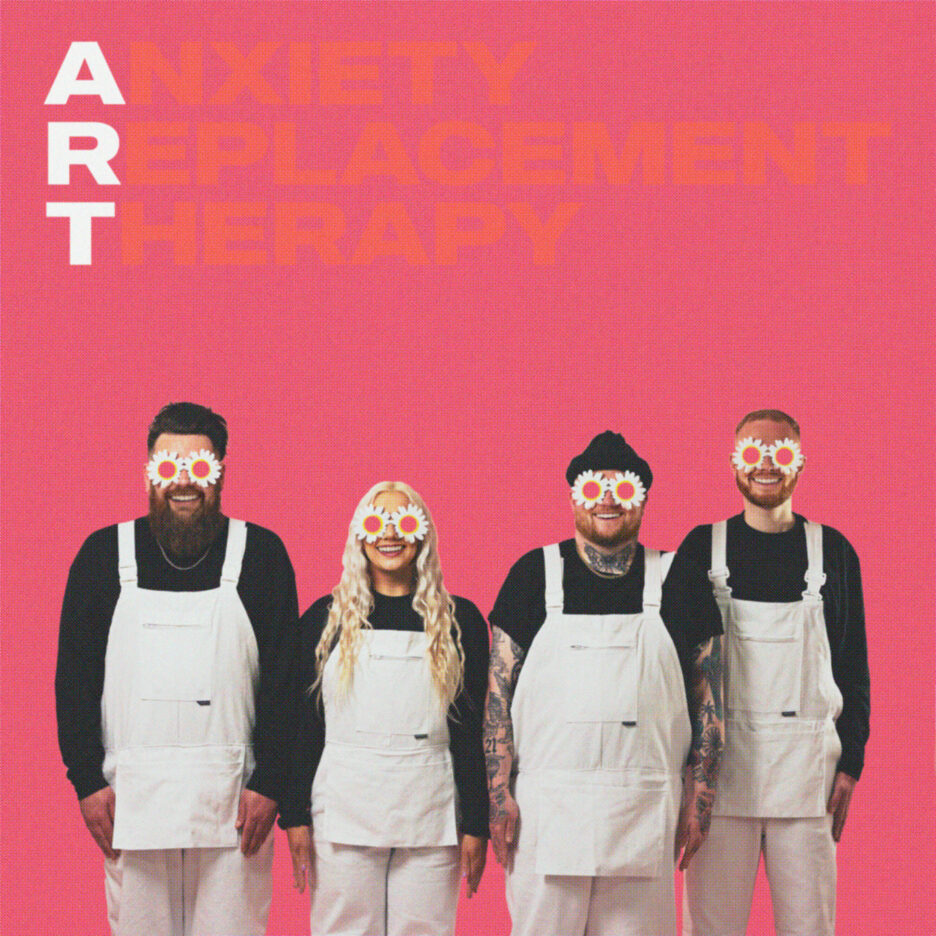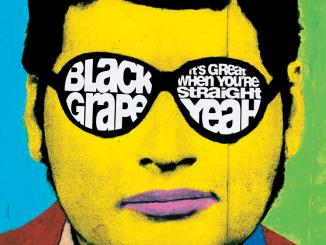The term’ hard-working band’ is thrown about quite often. It’s become quite the cliché. The Lottery Winners frequently get this label attached to them as they are no strangers to touring and playing live at every opportunity. For example, they came straight from supporting Frank Turner on his UK tour and swiftly set out on their own sojourn around this sceptred isle. However, most bands don’t become shopkeepers.
To celebrate the launch of their 5th studio album, Anxiety Replacement Therapy, the band from Leigh, Greater Manchester, has decided to open a shop in their hometown. Open for one week in the Spinning Gate Shopping Centre; they will all be channelling their inner Arkwright. Not the most orthodox promotional strategy for a band, but The Lottery Winners do not subscribe to orthodoxy. So, should you pop along to buy a copy?
Firstly, I think the album should be called ‘A Cornucopia of Earworms.’ You will find yourself singing and humming parts of these tracks frequently. It may be a strategy of subconscious brain control by the band. Don’t try to play their songs backwards, as it may open a portal or something equally abnormal.
Whilst you might want to pick out certain tracks to listen to initially, I would suggest listening to the album in its entirety a few times first. The album plots the journey of lead singer, guitarist and songwriter Thom Rylance and a personally challenging year. Dealing with disabling anxiety and his undiagnosed ADHD, the songs reflect falling into emotional darkness and the crippling paralysis it creates, and gradually finding his way back towards the light. They are sequenced in the chronological order they were written – taking you on a guided tour of the life and (dark) times of Thom Rylance. The ten songs are supported by three short, narrated pieces that mimic yesteryear’s self-help tapes. Anxiety Replacement Therapy is Rylance’s deeply personal therapeutic response to his mental health issues.
The first track you encounter is ‘[PLAY]’, the first of the three narrated segments. It has moments where the sound distorts, replicating the feeling of damage occurring and the inability to focus. We are then told, “Focus on yourself/Anxiety Replacement Therapy will begin now”.
‘Worry’ throws us straight in at the deep end. “Cuts me like a razor blade/All of the mistakes that I have made/Running through my mind (I think, I think, I think)/Life stuck in rewind” is a very accurate description of anxiety. You see, I also suffer from anxiety, which can be utterly destructive. Joe Singleton’s drums drive through the track, creating a feeling of being unable to switch off and relax. Despite the subject, it could be an absolute banger in the clubs.
The radio-friendly ‘Burning House’ follows, allowing us to hear the great pop/rock voice of Katie Lloyd as she belts out the chorus. This is the musical equivalent of the popular meme of a dog sitting in a burning house whilst saying, “Everything is fine”. I can picture Rylance sitting in his underwear, scrolling through garbage on social media while he feels as if his life is falling apart. I don’t say that to be insulting – I’ve been there myself.
Shaun Ryder gets to reprise the line “Call the cops!” from ‘Step On’ by Happy Mondays in ‘Money’. His unmistakable dulcet tones do not sound out of place on this track. Maybe it’s because the song has an 80s vibe, akin to some of the songs Happy Mondays had great chart success with. And that Ryder cackle… It is a song about wanting and deserving a better life. Is that unreasonable? Money can help, yet many see our incomes squeezed, applying pressure to our daily lives. Austerity certainly sucks, and it impacts people’s mental health. It seems like a high price to pay. And Rylance wants us to consider that.
Bringing the tempo down a little, ‘Long Way Down’ creates the feeling of falling into a spiral of depression – wanting to be anywhere but here in the moment. The guitars of Rylance and Rob Lally create a sonic sense of despair. Rylance sings, “Brain’s been on vacation for some time”, emphasising the numbness the mind feels. He repeats the line, “I’ll hate myself in the morning”, at the end of the track as he berates himself, seemingly for drinking too much to numb the pain and waking up on the bathroom floor again. Welcome to rock bottom.
‘Sertraline’ explores Rylance being placed on medication to help his recovery. Sertraline is a commonly prescribed SSRI (Selective Serotonin Reuptake Inhibitor) used to help with depression and anxiety. It can be very effective, and Rylance has stated he’s found it helpful. He has said that, before taking Sertraline, he felt emotions strongly – either very happy or intensely sad. Now he holds the middle ground and has more balance and a better steering wheel.
A great indie rock song, Rylance starts to slowly tip the scales back towards being mentally healthy. This is his tipping point as he sings, “My pocket’s full of poetry, but I’ve no-one to impress/And I’m sitting on my own again in my favourite yellow dress/Well, I hold on to these memories in case I let go again/And I don’t care for reality, it’s better to pretend”. However, his Sertraline sees him start the journey to shaking off these thoughts and feelings and regaining control of his life.
Now we hit ‘[PAUSE]’, another of the narrated pieces. This is the centre point of Rylance’s experience of this episode of his mental health issues. Take a breath. Take some time out. Take your Sertraline. Reflect, respond and rebuild.
We move into more positive territory with ‘Letter to Myself’ as Rylance imparts the benefit of hindsight to his younger self. With Frank Turner featured on the track, it covers an age-old story of what you would say to yourself with the benefit of life experience. The song mixes Mike Skinner’s (The Streets) and Baz Luhrmann’s ‘Everybody’s Free (To Wear Sunscreen)’ with a rock edge. “Don’t rush; take your time to be a kid”, raps Rylance. I won’t argue with that. Rylance believed he was a bad kid, getting into bother too often. Looking back, his undiagnosed ADHD probably had much to do with it. Whilst it isn’t easy, sometimes you must leave the past behind you.
“Let’s live and not just exist”, croons Rylance in the next track ‘Jennie’. The Covid-19 lockdown caused many people to realise there was more to life than living to work. Working to live, now that’s the correct balance. ‘Jennie’ explores this idea of getting out of the rat race and finding a better way to live. “We’ve only got this one life”, opines Rylance. And he is right. This is another step in him finding his way out of his situation and learning about what makes him well and what aggravates his mental health.
The album’s tempo slows to a more mellow pace and sound for the final three songs. ‘Let Me Down’ features Boy George, and this track certainly has an aroma of Culture Club about it. “I can always count on you to let me down” makes this feel like a song about a failed relationship. In many ways, it is, but not between partners. This is Rylance breaking from negative and problematic thinking, leaving that part of his mind behind. He knows he can be his own worst enemy, another anxiety trait. I found this to be the album’s weak spot. Lyrically, it works. I can connect with everything he says. Musically, it doesn’t connect with me. However, I was never a fan of Culture Club, so that may be why.
‘Not Alone’ looks at the broader issues of people’s struggles. Whether it is money, work, relationships, sexuality or gender identity, to name but a few, we all hit the buffers from time to time. We can’t see a way out of a situation. We feel separated from society. So many people feel disconnected, like nobody understands, feeling like an outcast. Here, Rylance understands this, embraces it and cries, “There’s no such thing as normal!”. Surely, that line is a t-shirt waiting to happen.
Morrissey was the icon the disenfranchised were drawn to in the 80s and 90s. People who didn’t feel they fitted in adorned quiffs and carried gladioli. Is Rylance going to take up this mantle in the 20s? It wouldn’t surprise me. When I saw The Lottery Winners support Frank Turner at the Newcastle University Student Union, he was wearing a sticky star on his face to cover a zit. Maybe that will catch on at their gigs – woolly hats and sticky stars. Hopefully, he won’t go all peculiar as he gets older. Fingers crossed.
Lloyd provides beautiful backing vocals and a lovely bass line that bubbles under the melody in ‘Anxiety Replacement Therapy’, the final song on the album. Her bass playing feels like an engine running, which is how anxiety can often feel. With an R&B ambience, this song brings the album together. Towards the end of the track, Rylance returns to spoken word and orates a rap that connects every song. “I’m in a burning house, and I’ve got to get out/But I’m looking out the window, it’s a long way down”, Rylance states, bringing tracks three and five together, for example.
We end with ‘[STOP]’, the end of the therapy session, as the narrator utters, “We hope you have found some peace and clarity”. The writing of this album was Thom Rylance’s way of dealing with his anxiety, a replacement therapy, if you will. Along with Lloyd, Lally and Singleton, The Lottery Winners have created an album that does justice to his writing and arduous journey. Full of 80s influence with a modern twist, rarely has mental health been dissected, reconstituted and utilised for musical entertainment so well. Not an easy task. It treats the subject matter with the importance, sensitivity, and respect it deserves but doesn’t browbeat you. This is not about lecturing folk but inviting them to understand one person’s tale while listening to banging choons.
As I stated earlier, listen to this album a few times from start to finish. Don’t stick it on random (CD/Streaming version), stylus skip (Vinyl version) or hit fast forward (Cassette version). Let it absorb into your mind. Allow yourself to walk alongside Rylance’s experiences, connecting with the story arc that unveils itself to you.
You will gain a greater appreciation of the album this way. You will better understand anxiety, how it manifests, and how tough it is to fight against it. You will also have listened to a thoroughly good album with far too many earworms than is strictly good for you – certainly more than the recommended daily amount.





Be the first to comment